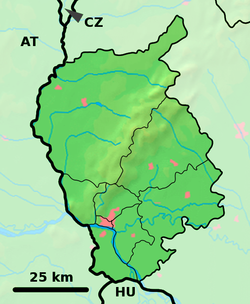Čunovo
Čunovo | |
|---|---|
Borough | |
 Local baroque church, built in the 18th century | |
 Area of Čunovo in Bratislava | |
Location of Čunovo in the Bratislava Region | |
| Coordinates: 48°01′47″N 17°11′56″E / 48.02972°N 17.19889°E | |
| Country | |
| Region | |
| District | Bratislava V |
| First mentioned | 1232 (Julian) |
| Government | |
| • Mayor | Gabriela Ferenčáková |
| Area | |
• Total | 18.62 km2 (7.19 sq mi) |
| Elevation | 130 m (430 ft) |
| Population (1 January 2021) | |
• Total | 1,635 |
| • Density | 88/km2 (230/sq mi) |
| Time zone | UTC+1 (CET) |
| • Summer (DST) | UTC+2 (CEST) |
| Postal code | 851 10 |
| Area code | +421-2 |
| Car plate | BA, BL, BT |
| Website | www |
 | |
Čunovo (Croatian: Čunovo, Hungarian: Dunacsún, Duna-Csún, German: Sandorf) is a small part of Bratislava, Slovakia, in the southern area near the Hungarian border. It is located close to the Gabčíkovo - Nagymaros Dams.
History
[edit]Čunovo was first mentioned as a village in 1232 under the name Chun. In the 16th century, Croats fleeing the Ottomans in the south settled in the village. Until 1947, Čunovo, along with Jarovce and Rusovce, was part of Hungary and was annexed that year, it was annexed to Czechoslovakia, to enable construction of the Port of Bratislava. It became an official part of Bratislava on January 1, 1972. Some of the inhabitants still speak the Croatian language and preserve folk traditions.
Tourism
[edit]In 2000, a new art museum called Danubiana was opened. Dunajské luhy Protected Landscape Area comprises some parts of the borough. It is home to Čunovo Water Sports Centre an artificial whitewater facility built in 1996 which attracts paddlers from around the world.
Transport
[edit]Čunovo is close to the international motorway E65/E75 and railway crossing to Hungary. The first town inside Hungary is Rajka.
Since 21 December 2007, all border controls have been lifted as Hungary and Slovakia became part of the Schengen Area.
Demographics
[edit]According to the 2011 census, the municipality had 1,010 inhabitants. 778 of inhabitants were Slovaks, 124 Croats, 66 Hungarians and 42 others and unspecified.[1]
Gallery
[edit]-
The Danubian Meulensteen Art Museum, near Čunovo.
-
Tripoint with Austria-Hungary-Slovakia near Čunovo.
-
Passport enty stamp via road from Čunovo.
References
[edit]- ^ Obce Narodnost Archived 14 November 2012 at the Wayback Machine
External links
[edit]






